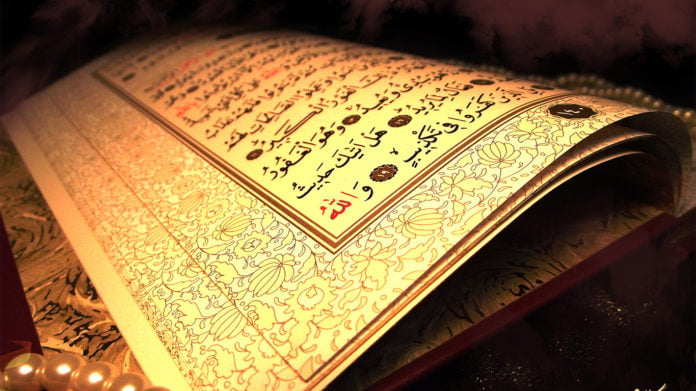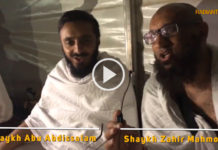| 1) When Allahs help and victory arrive, 2) and you see people embracing Allahs religion in crowds, 3) then glorify your Lord, all the while praising Him, and ask His forgiveness. He is the Ever-Returning. |
This noble chapter bears glad-tidings for the Messenger of Allah ﷺ and a command when he sees their fruition; it also contains an indication of what follows next from these glad-tidings.[1] The glad-tidings are tidings of Allahs aiding His Messenger ﷺ, the conquest of Mecca and people embracing true faith in crowds, When Allahs help and victory arrive and you see people embracing Allahs religion in crowds,” many of whom will be from his tribe and family after having been his antagonists. This occurred.
The command is to show gratitude to his Lord, “then glorify your Lord, all the while praising Him, and ask His forgiveness.”
The indication of what will follow on from this is two-fold: the first is that victory will remain for the religion and it will increase with the Messenger of Allah ﷺ glorifying and praising Allah and asking His forgiveness. This is an expression of gratitude about which Allah says, If you are grateful, I will grant you increase.[2] This fact was also actualised in the time of the Rightly Guided Khalifs and after them. This aid remained until Islam spread to an extent that no other religion had spread, and nations and people embraced the religion as had not been done for any other religion. Then, this nation began to oppose the command of Allah and they were tried with splitting and discord; then what followed followed. Yet, despite this, Allah still shows this nation and religion mercy and kindness the extent of which does not even cross the mind!
The second is that the Messenger of Allah ﷺ was soon to pass away. This is because his life is a noble life which Allah Himself took an oath by. It is known in Islam that noble matters are completed by asking Allahs forgiveness as we see in the case of prayer and Hajj for example. Allahs ordering the Prophet ﷺ to praise Him and ask forgiveness while in this state indicates that his time has come and that he should now prepare himself for the meeting with his Lord and that he should end his life with one of the best deeds. May Allah shower abundant peace and blessings upon him!
He would frequently implement this verse of the Quran in his ruku` and sujud by saying, Glory be to Allah, our Lord, and all praise; O Allah forgive me!
Endnotes
1. Nasai recorded from `Ubaydullah ibn `Abdullah ibn `Utbah that Ibn `Abbas said to him,
| Ibn `Utbah, do you know the last Surah of the Quran that was revealed He answered, Yes, it was: When Allahs help and victory arrive… Ibn `Abbas said, You have spoken truthfully. |
Bukhari recorded that Ibn `Abbas said,
| `Umar used to bring me into the gatherings with the seniors of (the battle of) Badr. However, it was as if one of them disliked my attending and asked, Why do you bring this lad to sit with us when we have children like him? `Umar replied, We know his worth. Then, one day, he called them and invited me to sit with them, I think that the only reason he did so was to prove his point. He asked, What do you say about Allahs statement, When Allahs help and victory arrive. Some of them said, We were commanded to praise Allah and ask His forgiveness when He helps us and gives us victory. Some of them remained silent and did not say anything. Then `Umar asked me, Ibn `Abbas, is this what you say? I replied, No. He asked, What do you say? I said, It marks the end of the life of Allahs Messenger ﷺ. Allah said, When Allah’s help and victory arrive which means that is a sign of your passing away. Then glorify your Lord, all the while praising Him, and ask His forgiveness. He is the Ever-Returning. `Umar ibn al-Khattab said, I do know no more about it than what you have said. |
2. Ibrahim (14): 9
(NOTE: If you want to build a strong and powerful relationship with Allah, check out Islamia TV, where you can watch Islamic speakers from across the globe deliver inspiring and motivational courses. Learn more at www.islamia.tv.)




















